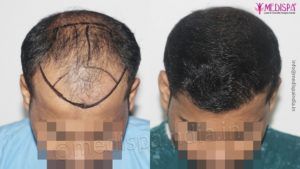
Today, we’ll look at two typical treatment options for baldness: medications and hair transplantation.
Hair loss can be transient or long-term. When it comes to temporary hair loss, the good news is that there isn’t much you can do to reverse the process, and a healthy diet can help. Permanent hair loss, on the other hand, is significant because you will almost certainly require medical attention.
How would you know what type of hair loss you have? You won’t be able to tell the difference between temporary and permanent, but your doctor will!
So, if you notice more than 100 hairs falling out per day,
If you notice clumps of hair in the sink after a shower, in your comb, or on your pillow, you should be concerned and seek medical help as soon as possible.
Allowing your hair to fall out should not cause you to lose confidence, since technology has provided numerous treatment choices. If you stay put, you’ll be able to treat it permanently.
Your doctor may suggest you to take certain drugs. We will learn how beneficial these treatments are in the section following. Hair transplantation is another therapeutic option that has garnered a lot of popularity around the world.
Hair transplant in Jaipur has advanced to the point where most local and international patients prefer to travel to Jaipur for hair transplant tourism. The quality of therapy you receive in Jaipur attracts international attention, but the low hair transplant cost in Jaipur is also a factor.
Medispa hair transplant center is a one-stop destination for all of your hair loss issues. We would locate you a legitimate treatment for a permanent answer to your hair loss problem, whether it was temporary or permanent. Our skilled staff is dedicated to tailoring your therapy to your specific needs and providing you with not only the best but also the most convenient hair loss treatment available.
To take advantage of the greatest deals, make an appointment with Medispa hair transplant clinic today: a place that will exceed your expectations for total hair care.
Let’s examine the two major treatment options: medications and hair transplants, while we’re on the subject.
Let’s look at the differences between medication and hair transplantation to see which is the better alternative.
Medications as a hair loss solution
You might be ecstatic to learn that you can treat your baldness with medicines rather than undergoing surgery. To be honest, medications cannot be a viable option to hair transplantation in the case of hair loss. The medications used in the hair loss treatment are listed below.
Minoxidil is a topical drug that may be purchased over the counter at pharmacies. The lotion is applied to the desired location and works by reducing hair loss and thickening the hair, giving the appearance of high hair density. Many people have stated that this effect lasts just a short time and that once the medication is stopped, they are back to square one.
Finasteride is an orally administered medicine that is available by prescription in pharmacies. This medicine works by reducing the rate of hair loss and increasing the rate of hair growth. There are some negative effects to this medicine that make it unsuitable for long-term use. If you stop taking the drug, the results will revert, making them only temporary. Furthermore, these drugs are not recommended for women of reproductive age.
As a result, drugs cannot be considered a sure-fire solution for hair loss. This short-term solution is ineffective in the long run.
Hair transplant: the most compelling remedy for hair loss
When it comes to hair transplants, the first and most important benefit is that the results are permanent. As a result, once the procedure is completed, you will have hair growth in that specific location for the rest of your life. Hair transplantation is a surgical process in which hair grafts are harvested from donor locations and then transplanted to the desired bald area.
The donor area refers to the portions of the body that have permanent hair roots, such as the back and sides of the head, the chest, the beard, the axilla, and the pubic area.
Because these procedures are surgical, you cannot expect to make a decision on whether or not to have them done right away, and consultation is an unavoidable part in the planning process. Hair transplantation may or may not be possible in your instance, depending on the hair transplant surgeon you are considering.
Which one is better: hair transplant vs Medications?
If you’re looking for a comparison between medications and hair transplants, there’s not much to say because it’s been done before.
Only in cases of early hair loss, when the baldness is not obvious, could medications be used. Hair transplantation, on the other hand, can be done at any stage of baldness if you are a good candidate.
Hair transplant selects hair grafts from other areas and successfully restores the already bald area. Medications may temporarily resolve hair loss and cannot restore the already established bald area, but hair transplant selects hair grafts from other areas and successfully restores the already bald area.
If you choose the greatest surgeon, the results of a hair transplant are highly predictable, but medications have a high risk of relapse and are extremely unpredictable.
Following long-term pharmaceutical use, you might expect a number of irreversible side effects, but after hair transplant, side effects are uncommon and minor, such as swelling, moderate soreness, and itching for a few days. As a result, you may see that drugs cannot be used as a long-term remedy for hair loss and that hair transplant is a viable alternative.





